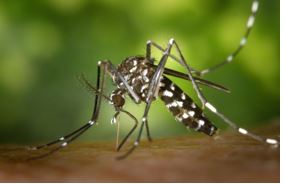Vaccine candidate shows efficacy against Dengue
Dengue is caused by four distinct virus serotypes transmitted by mosquitoes. It is a threat to nearly half of the world’s population. Currently, there is no specific treatment available for dengue. It is a health priority in many countries of Latin America and Asia where epidemics occur regularly.
The yellow fever mosquito can spread the dengue fever and yellow fever viruses, and other diseases. The mosquito is a small, dark mosquito of approximately 4 to 7 millimeters with typical white markings on the legs and a marking of the form of a lyre on the thorax. Dengue is transmitted by a mosquito bite that could cause infection of one of four dengue virus (DENV) serotypes, known as DENV1-4.
Symptoms of dengue include fever, severe headache, joint pain, muscle and bone pain, severe pain behind the eyes and mild bleeding – such as nose bleed. A more severe form of the virus is known as dengue hemorrhagic fever, characterized by prolonged fever, abdominal pain, persistent vomiting, bleeding and breathing problems. According to the World Health Organization, more than 22,000 people worldwide die from dengue each year, the majority of whom are children. Dengue is underreported because the disease is often misdiagnosed due to a large spectrum of clinical symptoms from mild non-specific illness to life threatening complications and because of the limitations of the surveillance systems.
Sanofi Pasteur’s dengue vaccine candidate is the most clinically and industrially advanced vaccine candidate in development. Two pivotal Phase III efficacy studies involved more than 31,000 volunteers from Asia (Indonesia, Malaysia, the Philippines, Thailand and Vietnam) and Latin America (Brazil, Colombia, Honduras, Mexico and Puerto Rico). The Phase III trials provided pivotal data on efficacy, safety, and immunogenicity of the vaccine candidate in a broad population and different epidemiological environments and assess the potential public health impact of the vaccine on the disease burden.
“The results of this first phase III study show the potential of the vaccine to have a significant impact on public health,” commented Dr. Maria Rosario Capeding, study principal investigator, Research Institute for Tropical Medicine, the Philippines. “The threat of severe dengue disease creates fear in the community. The vaccine’s impact on preventing dengue hemorrhagic fever is noteworthy. A vaccine that is able to avoid the personal suffering and reduce this significant health burden would change the lives of millions.”
“The high efficacy observed against severe dengue and the reduction of hospitalization by two thirds is an extremely important public health outcome. Furthermore this dengue vaccine continues to meet the highest safety expectations, which is very reassuring,” commented Professor Duane Gubler, Professor and Founding Director of the Signature Research Program on Emerging Infectious Diseases, Duke-NUS Graduate Medical School, Singapore, and Chairman of the Partnership for Dengue Control.
Pooled vaccine efficacy against dengue of any severity and any serotype from the efficacy surveillance phase among participants who were 9 years of age or older was 65.6%; pooled vaccine efficacies for serotype-specific dengue were all higher than the nonpooled vaccine efficacies. On the basis of a limited number of participants in the immunogenicity subgroups, pooled analyses of data from participants who were 9 years of age or older showed that the vaccine efficacies were 81.9% (95% CI, 67.2 to 90.0) among seropositive participants and 52.5% (95% CI, 5.9 to 76.1) among seronegative participants
“Efficacy and Long-Term Safety of a Dengue Vaccine in Regions of Endemic Disease” study report can be found in the New England J Med link (July 27, 2015) http://www.nejm.org/doi/full/10.1056/NEJMoa1506223
